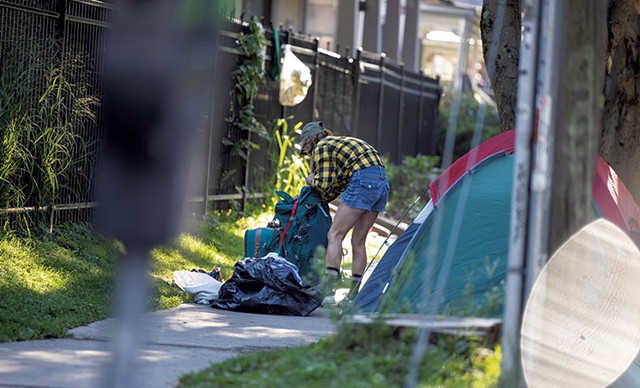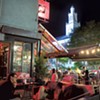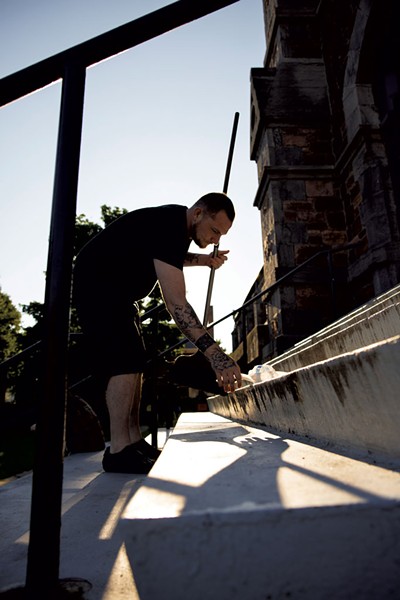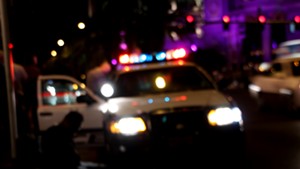
- James Buck
- A person encamped on Buell Street outside the First Congregational Church of Burlington
My friends visiting from San Diego didn't really take notice of what ails Burlington — at first. Where they live, the tangle of homelessness, addiction, gun violence and mental illness occupies a lot more sidewalk space than in the Queen City. Biking along the waterfront last Friday afternoon, they expected to find some variation of a shantytown as evidence of the worsening situation they'd heard about from Vermont family and friends.
"People are camped here in the woods," I told them, but I could see from their puzzled expressions that they thought I was overstating the problem.
The next day, we woke up to the news that someone had been shot dead in front of the Church Street bar Red Square in the wee hours of Saturday morning. On a warm, dry summer night, the downtown had been packed with people, including new and returning college students. Seven Days news reporter Derek Brouwer, who lives in my Burlington neighborhood, started his weekend by informing our readers about the incident in an online story. Later he added a telling and tragic detail: The murder was prompted by a dispute over a bar tab.
Related Bar Tab Dispute Preceded Fatal Burlington Shooting, Cops Say

There's no easy way to say that Burlington, like so many other communities around the country, has seen better days. And I mean that literally. Every time Seven Days journalists accurately describe what's happening in Vermont's largest city, we get an earful from two groups: those who think that, by exposing and describing the problem, we are sensationalizing it, discouraging visitors and making the situation worse; and others who allege we are a mouthpiece of Burlington's Progressive Party. Anonymously, one recently emailed: "a moderate or conservative paper would never say that a community is 'adapting' to open drug use, blatant crime with zero repercussions from the state's attorney, or a mayor who looks the other way and tells [us] it's all fine and dandy."
The writer is referencing the cover story we published two weeks ago: "Downtown Dilemma" by Courtney Lamdin. What set readers off was the single sentence below the headline explaining what the story is about and why they should care: "Plagued by homelessness, drugs and safety concerns, Burlington tries to adapt to a new normal."
Some read "adapt" as a synonym of "accept," which it's not. The subhead was simply a description of what Courtney discovered in her reporting — how local merchants, politicians, clergy and first responders are dealing with social problems on a scale never seen here before.

- James Buck
- A man cleaning trash outside First United Methodist Church of Burlington
Judging from the rate at which the papers flew off the racks, Burlingtonians are deeply concerned about their city. Increasingly, parents of students at the University of Vermont and Champlain College are, too. One wrote anonymously to thank us for the story, noting it "depicted similar experiences I've had on Church Street this last week after dropping my child off at UVM ... I felt very worried leaving my freshman daughter here. Had we known of the drastic changes since our college visits, we may have reconsidered. Hope things change quick as word is getting out..."
As I was writing this column, another UVM parent emailed with multiple complaints, including off-campus break-ins. She said her UVM daughters "both avoid the downtown area due to safety concerns." Then, on Tuesday the university invited all "UVM families" to an interactive online discussion on Wednesday, August 28, at 7 p.m. via Zoom. It promised: "We will provide updates and answer questions about safety and security related to our campus community."
I'm friends with Beth Sightler, an Old North End resident who runs Washington County Mental Health Services — in other words, she's no stranger to social work. On Sunday she posted on Facebook a list of recent horrors close to home that she has seen or heard about: people passed out in her driveway and injecting drugs on her porch, shoplifting, an urban road rage incident involving guns. One of her colleagues witnessed the Red Square shooting.
Her online chronicle started with a trigger warning: "This post is about drug use, violence, theft and mental illness as seen from our corner in the Old North End, this week. If you find any of that upsetting scroll on by."
The final line was a question that all of us, including everyone at Seven Days, seem to be asking: "What can we do as a community?"
The job of this newspaper is to accurately inform the public — when things happen, our reporters talk to the people involved and represent as many sides of the story as possible. We aim to not just tell you what happened but also provide some context for it.
To that end, please tell us what you're seeing. Let us know how things are changing and if your behavior is changing as a result. Let us know, too, if you notice someone going above and beyond to fix things. Have you been to a city somewhere that has managed to figure this out? Email us at [email protected], or call deputy news editor Sasha Goldstein at 802-865-1020, ext. 145.
We're listening. Not everything makes it into print, but all of it influences our reporting on this place we care about.














Comments
Comments are closed.
From 2014-2020, Seven Days allowed readers to comment on all stories posted on our website. While we've appreciated the suggestions and insights, right now Seven Days is prioritizing our core mission — producing high-quality, responsible local journalism — over moderating online debates between readers.
To criticize, correct or praise our reporting, please send us a letter to the editor or send us a tip. We’ll check it out and report the results.
Online comments may return when we have better tech tools for managing them. Thanks for reading.